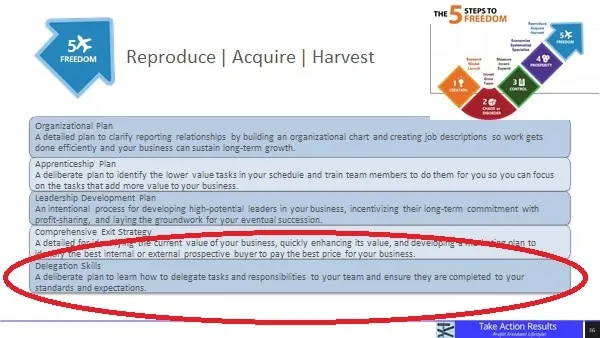Delegation Plan
So what is a Delegation Plan? It is a deliberate plan to learn how to delegate tasks and responsibilities to your team and ensure they are completed to your standards and expectations. According to Wikipedia, Delegation is the assignment of any authority to another person (normally from a manager to a subordinate) to carry out specific activities.
Why is a Delegation Plan important? The Delegation Plan is the piece that totally empowers your Apprenticeship Plan. It offers very specific benefits to the business owner including
1. Completely freeing the owner from certain tasks and responsibilities. How the owner uses this free time is completely up to him or her but it could mean more time to focus ‘on’ the business or more free personal time away from the business.
2. Creates a framework for responsibility and accountability against which important HR functions like annual evaluations, bonuses and other incentives can be objectively determined.
3. Develops a corporate culture that addresses the construct that the direct value an employee brings to a business is determined by the number and size of the tasks, responsibilities, challenges and problems they take on and complete.
4. Creates a model to move beyond just delegation to full employee empowerment.
The Delegation Plan is formally positioned on the Freedom step of the Five Steps to Freedom framework. You do not have to wait until your business is moving into the Freedom step to start to implement this plan but to actually be in the Freedom Step this plan must be fully in place.
How does your business stack up right now? Simply score your Delegation Plan from 1 to 5. A score of 5 means: ‘You constantly evaluate your own schedule to locate more tasks to delegate. You delegate appropriately based on your employee’s level of competency for a specific task. “Who else could do this?” has become your guiding question.. A score of 1 means: ‘You are a bottleneck in your business – everything needs to come through you. You resist delegating because “no one can do this as well as I can” or because you believe it will take longer to train someone to do it – it would be faster to just do it yourself.’

What Delegation is NOT! Delegation is not just about handing off tasks without very specific guidance and expectations. Poor Delegation is tantamount to Abdication!
For Delegation to be done well there have to be 3 components. Like a 3 legged stool if one of these is missing the stool cannot function.
1. Authority. When you delegate a task to someone you must also delegate to them the Authority to complete the task. For complex tasks you may wish to limit the Authority given and at key points in the process ask the employee to come back to you for a decision but for most tasks this should not be necessary. Authority is especially critical when the employee has to get assistance or support from other members of the team who that employee has no typical direct responsibility over but with your Authority they can move ahead with your delegated authority. You must be cautious in what Authority you delegate and everyone should be aware of what the Authority includes and involved so it is not abused whether directly or indirectly.
2. Responsibility. When you delegate the task you must also delegate the responsibility to complete the task. The employee must clearly understand what they are responsible to complete and how they are required to report that completion to you and/or the larger organization.
3. Accountability. The final leg of the stool is accountability. Along with the Authority and Responsibility, the employee must accept being held Accountability for the task, whether that be the timing, quality, quantity or anything else.
There are 9 steps to a successful Delegation as follows
1. Define the Task – does this task fit your delegation criteria and is it suitable to be delegated?
2. Select the Individual or Team – determine if this can be delegated to an individual or a team and what you want to get out of it and what you want them to get out of it too.
3. Assess their Ability – is the person or team capable of completing the task or do they require training or support to complete the task? You may need to review The Apprenticeship Plan as it directly relates and supports this step of the Delegation Plan.
4. Explain the Reasons – you need to be able to explain to the person or team why the task is being delegated and how important and relevant it is to the company.
5. State Required Results – what is required, how is it being measured and how do you want to be informed or updated on progress.
6. Provide Resources – discuss and assign resources to get the task completed like personnel, budget, space, etc.
7. Agree to Deadlines – agree on the by when timelines including interim progress timings and/or final completion date.
8. Support and Communication – it is up to you to inform the people in the company that need to know what has been delegated and to who.
9. Give Feedback on Results – you must provide feedback on the results and if there are interim milestones that are being reported you must provide feedback and potential advice and new guidance on them as well.
Now there is a school of thought in the literature that there is a difference between Delegation and Empowerment. Some believe Empowerment is achieved when all of the 3-legged stool components and especially Authority are given. To me there is a hierarchy or multiple levels of Delegation that range from these 2 extremes
1. “Wait to be told.” or “Do exactly what I say.” or “Follow these instructions precisely.” Note this is instruction. There is no delegated freedom at all.
2. “Decide where action needs to be taken and manage the situation accordingly. It’s your area of responsibility now.”
If you would like to learn how to get the most out of every opportunity in your business to get to the ideal business model needed for long term growth and success, book a short phone call with me to chat. To your Success!
Other Posts
Apprenticeship Plan
Comprehensive Exit Strategy
Crisis Leadership
Delegation Plan
Employee Acquisition Plan
Leadership Continuum
Leadership Development Plan
Mastery Continuum
Metrics That Matter
Organizational Plan
Psychometric Profiling
Sales Continuum
Sales Management Plan
Success Continuum
Tactical Marketing Plan
Time Management Plan
Why A Coach?
© Action Leadership Inc. 2025
All Rights Reserved
624 Cantor Landing SW, Edmonton, T6W 0V6
